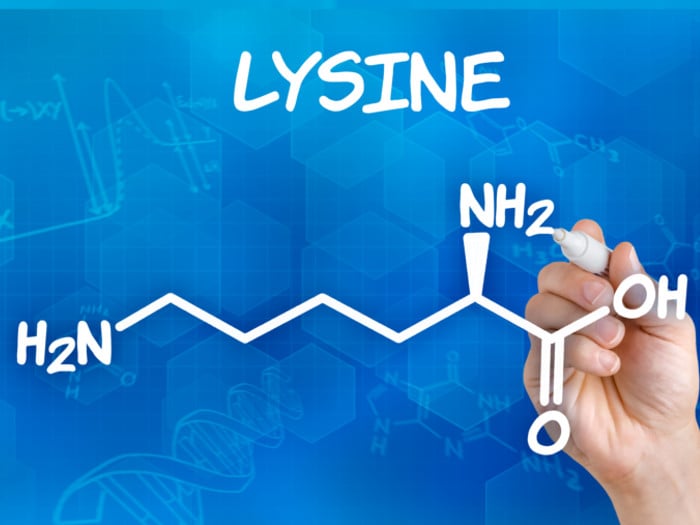The importance of lysine in the body cannot be overstated, but before you begin changing your diet or supplementing with this compound, you should understand all the details.
What is Lysine?
Lysine is a critical amino acid that is used by the body in the synthesis of proteins. In scientific circles, this amino acid will often be referred to as l-lysine. More specifically, lysine is responsible for much of the calcium absorption in the body, which is essential for many aspects of health. This amino acid is also involved in muscle development and growth, as well as the production of various hormones and antibodies needed for proper metabolic function and defense. Lysine is not naturally produced by the body, and must, therefore, be consumed through your diet or supplementation. [1]

Lysine, an amino acid, is known to improve digestion. Photo Credit: Shutterstock
Lysine Benefits
The most important health benefits linked to proper lysine levels include the following:
- Improved digestion
- Increased bone mineral density
- Protection against inflammation
- Reduced anxiety
- Diabetes management
- Treatment of acne
Let us discuss them in detail below.
Anxiety
The effect of this amino acid on hormone production means that it will regulate your mood and decrease levels of stress hormones, thus lessening symptoms of anxiety. [2]
Diabetes
It has been shown in various research studies that increased levels of this amino acid will reduce the presence of certain negative compounds in the body. These compounds make it more difficult for the pancreas to regulate insulin and blood sugar levels, so inhibiting them will ease diabetic symptoms and improve quality of life. [3]
Herpes Virus
One of the most exciting benefits of this compound is related to the herpes virus. Advanced research is ongoing into how and why this amino acid is so effective at treating outbreaks and minimizing the reoccurrence of the condition. By limiting flare-ups, supplementation with lysine is very valuable indeed. [4]
Bone Density
As mentioned earlier, this amino acid is instrumental in calcium absorption in the body. Not only does this help to improve bone mineral density and protect against the onset of osteoporosis but it also improves the body’s ability to uptake and metabolize other key minerals. [5]
Acne
There are many treatments on the market for skin disorders that include l-lysine. This is because this compound can stimulate the immune system and prevent these types of infections and inflammation, through the production of antibodies. [6]
Digestion
Recent research has shown that this amino acid can help to reduce inflammation in the lining of the gut, which will prevent oxidative stress and lower your risk of “leaky gut syndrome”.
Lysine Deficiency
As mentioned, this is a very important amino acid in the body, so a deficiency in it can have dire consequences. Some of the main signs and symptoms of lysine deficiency include the following:
- Loss of appetite
- Stunted growth
- Slower healing rate
Due to this amino acid’s role in muscle development, as well as hormone production, the effects of not getting enough are quite serious. You might also experience the following:
- Change in moods
- Sleep cycle is off
This happens because your hormone production is being affected. Your body won’t be able to uptake minerals properly so you may develop other nutrient deficiencies. Continued deprivation of lysine can even lead to blindness and other serious complications.
Food Sources of Lysine
Everyone should get at least 12 milligrams of lysine per kilogram of their weight per day, which is quite easy to do if you eat a healthy and balanced diet. Protein sources from, both, plant and animal, as well as certain seeds and dairy products, can deliver this amino acid in high concentrations. If you are attempting to supplement or boost your levels of this amino acid, try adding the following foods to your diet.
All of these will contain measurable amounts of l-lysine, so be sure to snack healthy and your amino acid levels should be fine.
Lysine Side Effects
If you are taking lysine supplements or your body isn’t metabolizing it fast enough, there can be certain side effects, such as the following:
- Higher risk of kidney disease and gallstones
- Complications of pregnancy
This doesn’t typically happen, but in case of excess intake, or if a patient is unable to metabolize the amino acid, then it may cause unsafe levels of calcium in the blood. Furthermore, some people also experience gastrointestinal side effects when a high level of this amino acid is in their system, these include the following:
- Diarrhea
- Nausea
- Constipation
Again, these side effects are rare but speak to your doctor before increasing your intake.
